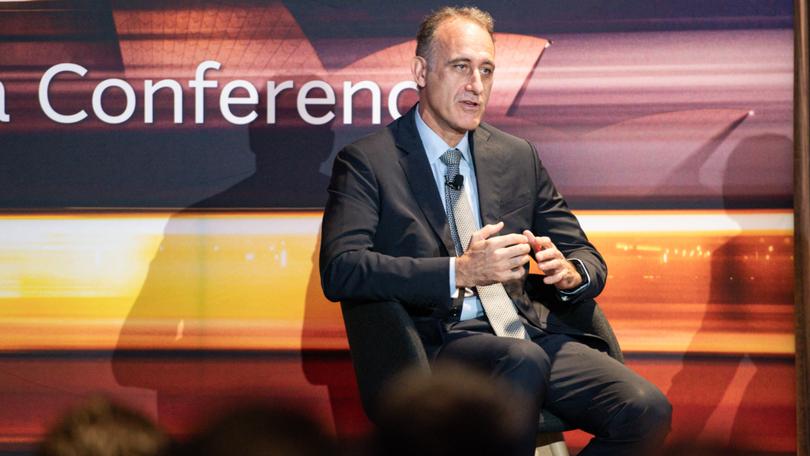Wesfarmers boss Rob Scott shoots down concerns about forced break-up of conglomerate
The Wesfarmers chief says a break-up of the growing conglomerate would put it at a ‘distinct disadvantage’ in taking on Amazon, but he is confident the Government’s regulatory axe wouldn’t swing.

Wesfarmers chief Rob Scott says breaking up the growing conglomerate would put it at a “distinct disadvantage” in taking on juggernaut Amazon, but he is confident the Federal Government’s increasingly powerful regulatory axe won’t swing.
Responding to questions about Wesfarmers’ level of concern regarding potential regulatory blowback to its increased size and scale, Mr Scott told the Macquarie Australia Conference in Sydney on Tuesday there had been “no suggestion there should be any break-up of our businesses”, and that any move to do so would only lift costs and hurt its competitiveness.
“I think its quite understood that we operate on a divisional autonomy model,” he said.
Sign up to The Nightly's newsletters.
Get the first look at the digital newspaper, curated daily stories and breaking headlines delivered to your inbox.
By continuing you agree to our Terms and Privacy Policy.“We pride ourselves on demonstrating that we are adding value to broader stakeholders into the community.
“Any break-up would only do two things — it would put our Australian businesses at a distinct competitive disadvantage against some very large global juggernauts ... the likes of Amazon and others, Costco and others, that would put us at a significant disadvantage. And secondly what would happen, particularly in a lot of regional areas we’d see prices go up.”
His comments come as supermarkets Coles and Woolworths fend off a push from frustrated consumers and the Greens to break-up the “Colesworth” duopoly and an increasingly active Australian Competition and Consumer Commission. The Greens have been targeting divestiture powers and chaired the Senate inquiry into supermarket prices, due to be handed down on Tuesday.
Both Coles and Woolworths told the Senate that Amazon was increasing in scale in Australia, and moving into groceries.
“Fortunately it hasn’t been a focus of our businesses today,” Mr Scott said.
Wesfarmers’ Kmart Group division — and its star-performing house brand Anko — have managed to weather inflationary pressures that have forced many retail customers to pull-back discretionary spending since the pandemic, without drawing public ire.
The CEO was of the view those pressures would continue until the end of the year, and that Wesfarmers shouldn’t get complacent just because the Australian economy was performing relatively well.
“I think it is likely that we’re going to find a lot of households and small businesses trying to manage this cost of doing business, cost of living challenge for the rest of this calendar year,” he said.
But it’s not just customers looking to balance budgets who are shopping at Kmart. Mr Scott said the group was seeing “more affluent customers trading down” into its brands.
“They’re simply saying ‘if I can get the same quality product at Anko without paying as much, why wouldnt I?’”
“We see opportunities both at the lower end of the market for customers doing it really tough, together with more affluent customers who might also be looking to save money on every-day essentials.”
The CEO also suggested that Anko would be trialling a small expansion into Asia after moving into the North American market.
“We’re also exploring, in partnership with an Asian partner, opening a couple of Anko trial stores ... in particular the Asian market just to test how a separate format would go. We’re not allocating a lot of capital to this.”
Over in Wesfarmers’ chemicals and energy division, WesCEF, Mr Scott said the group was evaluating the opportunity to scale up its production of ammonia — used mainly in the mining industry for blasting — but would need “greater certainty around the supply and pricing of domestic natural gas”.
“We’re still seeing good and strong demand for AN (ammonia nitrate), obviously a key source of demand is iron ore production in the Pilbara ... and we still see a good line of sight for further increases in developments there especially as new mines are opened up.”
He suggested there would be improved pricing for the product as existing contracts that were negotiated when there was excess supply in the market, came up for renewal.
“At the moment our plant and indeed our competitor Burrup plant are pretty much maxed out. So the market is more in balance.”
